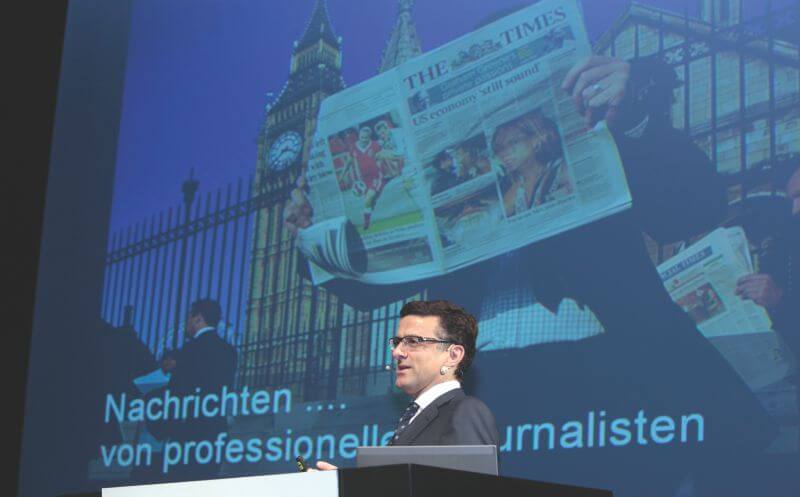
On the panel: five distinguished, highly skilled professionals, with five different points of view. Yet in the end, the consensus was: “Paper is a medium with a future”. The panel discussion hosted by Voith Paper as part of the “Literature Days” festival in Heidenheim was entertaining, enjoyable and a complete success for all those taking part.
A quick glance at the podium was enough to show a very exciting evening event to come at the packed Heidenheim Congress Center. This is where Voith Paper president Dr. Hans-Peter Sollinger took his place alongside Greenpeace Germany campaign manager Dr. Thomas Henningsen to discuss the future of paper. And with no time lost, the two of them embarked on the first dialogue of the evening – about the endeavors and successes of the paper industry in using increasingly less virgin fiber for paper production.
More recycling, less paper consumption
“The question in the future will be: Despite increasing demand for paper in countries such as India and China, how do we deal responsibly with the re-sources of energy, water and fibers,” said Dr. Sollinger. In his view, for example, part of this process is using even more recovered paper for new paper products. And the Greenpeace manager agreed that a higher recycling quota was exactly what he kept on demanding: “More recycling and less paper consumption; that is the solution for ecologically responsible conduct in the paper industry.”
“But aren’t we already using less and less paper thanks to the Internet etc?” asked Angela Elis, TV editor, author and panel facilitator. The answer to this question was provided by Thomas Brackvogel, Managing Director of the Neue Pressegesellschaft publishing company. “On the contrary, in our editorial offices we still use and print at least as much paper as before the growth of electronic media.” He had been listening closely to Dr. Sollinger’s opening speech and was surprised by one thing above all: the rise in demand for tissue paper. However, tonguein- cheek, he right away provided his own explanation: “Perhaps the global financial situation is bringing more tears to our eyes that then need to be wiped dry with something soft and fluffy.”
Increasing demand for packaging material
Returning to the serious issue of the future of paper, the discussion then turned to the significance of printed information in the form of daily and weekly newspapers, magazines and trade journals. “Naturally these media continue to have their place, but I don’t see them having much of a future,” interjected Sebastian Moleski. He was on the panel as president of Wikimedia Germany, whose best-known project is the online encyclopedia Wikipedia. Just take the example of the Brockhaus encyclopedia. In a direct comparison the currency of the entries in Wikipedia – which incidentally is used by journalists worldwide as a research tool – could not be bettered or replaced by the printed book. “We also shouldn’t forget that in one way electronic media even increases paper consumption: namely, for packaging material.“ Those ordering from the Internet want to have their goods delivered well packed. Board continues to be the packaging material of choice.
Preserve the book as a cultural asset
Dr. Michael Knoche offered a quite different perspective on the significance of paper. The Director of the Herzogin Anna Amalia Library in Weimar, Germany, made the point yet again that paper, in the form of books, is an important cultural asset which needs to be preserved and cultivated. “For centuries, knowledge has been imparted through books, and I am convinced that this will remain the case in the future too. What about the school textbook, or the children’s book? Do you really want to read out a bedtime story from an iPad?”
Admittedly, he added, there is no doubt that certain types of publication will disappear in the relentless trend towards using electronic media. “However, the figures from the Frankfurt Book Fair, for example, where around 300,000 new releases were showcased, speak for themselves, even if individual print run sizes are on the decline. Ambitious, well-written literature will always be read in book form.” This view was challenged by Wikimedia head Sebastian Moleski, who had on several occasions experimented with reading books on a tablet computer and found it easy.
Regardless of whether the works of the great philosophers are read in digital or printed form, or we actually need around 350 different daily newspapers in Germany alone, or paper consumption will actually rise as drastically as expected in the next 20 years – “Paper will always have a certain value and importance in society.” These were Dr. Sollinger’s concluding remarks, which got to the heart of the matter.



